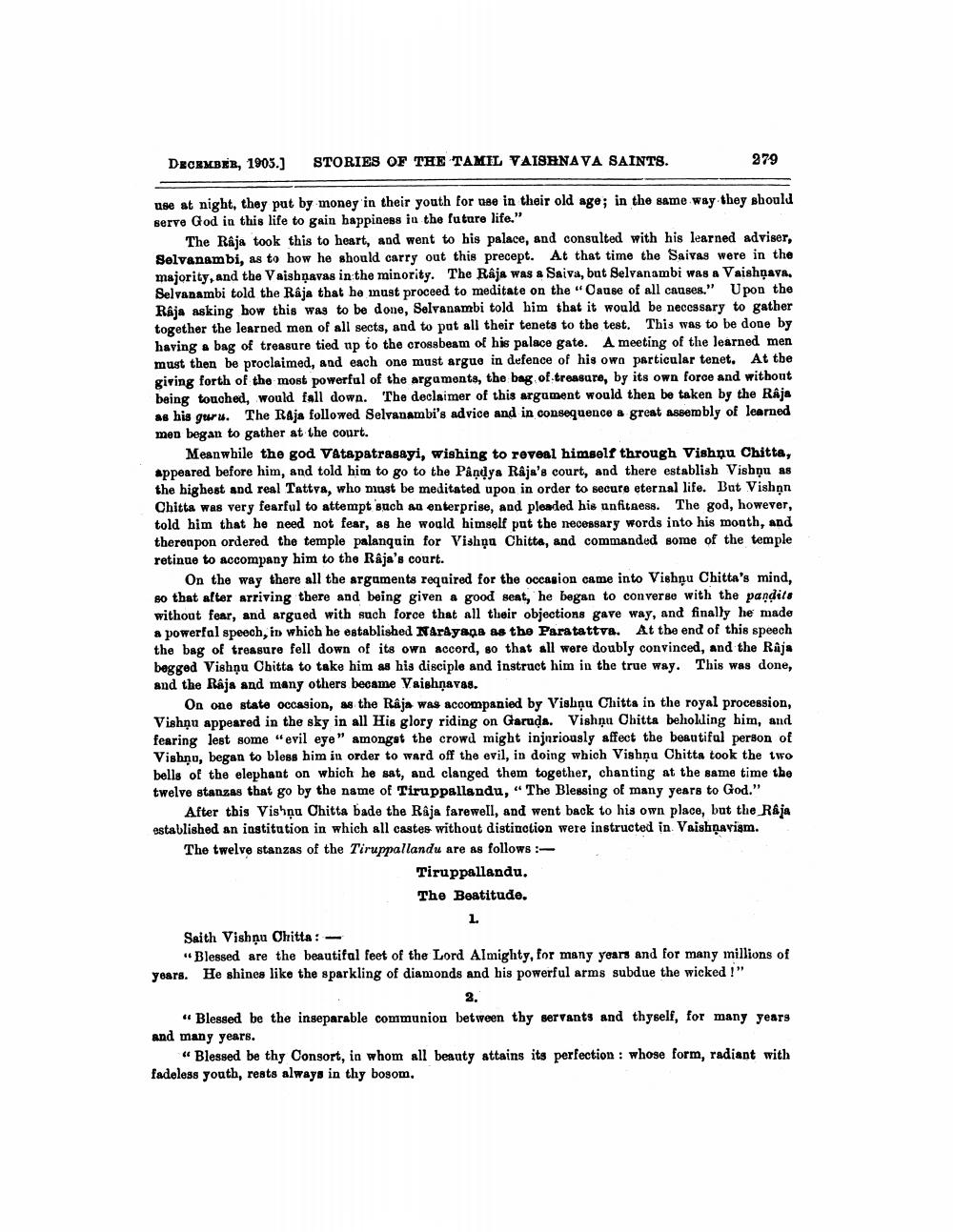________________
DECEMBER, 1905.)
STORIES OF THE TAMIL VAISHNAVA SAINTS.
279
use at night, they put by money in their youth for use in their old age; in the same way they should serve God in this life to gain happiness in the future life."
The Raja took this to heart, and went to his palace, and consulted with his learned adviser, Selvanambi, as to how he should carry out this precept. At that time the Saivas were in the majority, and the Vaishnavas in the minority. The Raja was a Saiva, bat Selvanambi was a Vaishnava. Selvanambi told the Raja that he must proceed to meditate on the "Cause of all causes." Upon the Raja asking how this was to be done, Selvanambi told him that it would be necessary to gather together the learned men of all sects, and to put all their tenets to the test. This was to be done by having a bag of treasure tied up to the crossbeam of his palace gate. A meeting of the learned men must then be proclaimed, and each one must argue in defence of his own particular tenet. At the giving forth of the most powerful of the arguments, the bag of treasure, by its own foroe and without being touched, would fall down. The declaimer of this argument would then be taken by the Raja as his guru. The Raja followed Selvanambi's advice and in consequence a great assembly of learned men began to gather at the court.
Meanwhile the god Vatapatrasayi, wishing to reveal himself through Vishnu Chitta, appeared before him, and told him to go to the Pandya Raja's court, and there establish Visbņu as the highest and real Tattva, who must be meditated upon in order to secure eternal life. Bat Vishạn Chitta was very fearful to attempt such an enterprise, and pleaded his unfitness. The god, however, told him that he need not fear, as he would himself put the necessary words into his month, and thereapon ordered the temple palanquin for Vishọa Chitta, and commanded some of the temple retinue to accompany him to the Raja's court.
On the way there all the arguments required for the occasion came into Vishņu Chitta's mind, 80 that after arriving there and being given a good seat, he began to converse with the pandits without fear, and argued with such force that all their objections gave way, and finally he made a powerfal speech, in which he established Narayana as the Paratattva. At the end of this speech the bag of treasure fell down of its own accord, so that all were doubly convinced, and the Raja begged Vishnu Chitta to take him as his disciple and instruct him in the true way. This was done, and the Raja and many others became Vaishnavas.
On one state occasion, as the Raja was accompanied by Vishņu Chitta in the royal procession, Vishņu appeared in the sky in all His glory riding on Garuda. Vishnu Chitta beholding him, and fearing lest some "evil eye" amongst the crowd might injnriously affect the beautiful person of Vishnu, began to bless him in order to ward off the evil, in doing which Vishna Chitta took the two bells of the elephant on which he sat, and clanged them together, chanting at the same time the twelve stanzas that go by the name of Tiruppallandu, "The Blessing of many years to God."
After this Vishnu Ohitta bade the Raja farewell, and went back to his own place, but the R&ja established an institution in which all castes without distinction were instructed in Vaishnavism. The twelve stanzas of the Tiruppallandu are as follows:
Tiruppallandu. The Beatitude.
Saith Vishņu Chitta :
"Blessed are the beautifal feet of the Lord Almighty, for many years and for many millions of years. He shines like the sparkling of diamonds and his powerful arms subdue the wicked !"
2. “Blessed be the inseparable communion between thy servants and thyself, for many years and many years.
« Blessed be thy Consort, in whom all beauty attains its perfection : whose form, radiant with fadeless youth, rests always in thy bosom,




